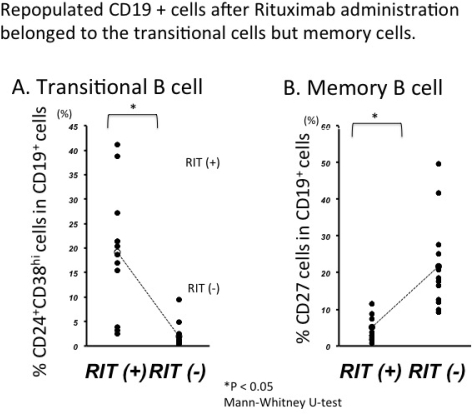The Effect of Rituximab Therapy on Regulatory B Cell and Prevention of Chronic Antibody Mediated Rejection in Kidney Transplantation Recipients
Urology, Tokyo Women's Medical University, Tokyo, Japan.
Meeting: 2015 American Transplant Congress
Abstract number: 261
Keywords: Alloantibodies, B cells, Kidney transplantation, Rejection
Session Information
Session Name: Concurrent Session: Basic Mechanisms of Chronic Injury and Fibrosis
Session Type: Concurrent Session
Date: Monday, May 4, 2015
Session Time: 4:00pm-5:30pm
 Presentation Time: 5:12pm-5:24pm
Presentation Time: 5:12pm-5:24pm
Location: Room 121-C
We previously reported that a single administration of low dose rituximab (RIT) before kidney transplant reduced the incidence rate of chronic antibody mediated rejection (CAMR) in long term. In the patients with autoimmune diseases, the major phenotype of repopulating B cells after RIT treatment was transitional B cells (TBs), which are also known as regulatory B cells. The aim of this study is to reveal the major phenotype in the repopulating B cells after RIT in kidney transplant recipients.
Peripheral blood mononuclear cells (PBMCs) were isolated from blood samples obtained from patients who underwent kidney transplant with RIT administration as part of a desensitization (N=16), or without RIT administration (N=13), 5-18 months before. Although the risk of CAMR was higher in the RIT(+) group, clinical outcomes such as the incidence rate of rejection and de novo donor-specific antibodies were not significantly different between the two groups. We analyzed the population of each B cell subset using flow cytometory as follows; naïve B cells (NBs); CD19+IgD+CD27–, memory B cells (MBs); CD19+CD27+, and TBs; CD19+CD38hiCD24hi. Consistent with the situation of autoimmune diseases, B cell reconstruction after RIT induction was also started from TBs, which were scarcely observed in the patients without RIT induction. MBs were clearly eliminated after RIT induction. The level of mRNA expression of IL-10, B Cell Activating Factor (BAFF), and Foxp3 in PBMCs were not significantly different between the patients with RIT and those without, although that of BAFF-receptor was significantly higher in RIT(+) group than that in RIT(-) group, suggesting high proliferative activity of TBs in RIT(+) groups. Taken together, we presume that RIT can control B cell immunity by modifying B cell subsets.
The level of mRNA expression of IL-10, B Cell Activating Factor (BAFF), and Foxp3 in PBMCs were not significantly different between the patients with RIT and those without, although that of BAFF-receptor was significantly higher in RIT(+) group than that in RIT(-) group, suggesting high proliferative activity of TBs in RIT(+) groups. Taken together, we presume that RIT can control B cell immunity by modifying B cell subsets.
To cite this abstract in AMA style:
Ikemiyagi M, Ishii R, Miyairi S, Hirai T, Omoto K, Tanabe K. The Effect of Rituximab Therapy on Regulatory B Cell and Prevention of Chronic Antibody Mediated Rejection in Kidney Transplantation Recipients [abstract]. Am J Transplant. 2015; 15 (suppl 3). https://atcmeetingabstracts.com/abstract/the-effect-of-rituximab-therapy-on-regulatory-b-cell-and-prevention-of-chronic-antibody-mediated-rejection-in-kidney-transplantation-recipients/. Accessed February 17, 2026.« Back to 2015 American Transplant Congress
